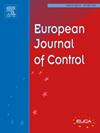Desired group consensus in arbitrary signed networks
IF 2.6
3区 计算机科学
Q2 AUTOMATION & CONTROL SYSTEMS
引用次数: 0
Abstract
This paper addresses the problem of achieving any desired group consensus in multi-agent systems (MAS) operating in arbitrary signed networks. By focusing on arbitrary network topologies, we develop a control strategy that drives the agents’ states towards any desired state, independent of initial conditions and network topology. Such a framework finds applications in targeted opinion formation in social networks to counter the spread of misinformation or opinion radicalization, spreading awareness through social media campaigns by governments or public health organizations, and in recommender systems. A key contribution is the introduction of a switching control mechanism that expands the range of reachable states, ensuring that any targeted outcome is attained for a given initial condition without imposing any constraints on the network structure. Our approach not only guarantees the formation of desired clusters but also ensures that each agent converges to the specified consensus value within its cluster. This gives a unified framework for addressing both the group as well as the scaled consensus problems. Mathematical analysis establishes conditions for achieving system stability and reachability to any desired state, based on which the control input is designed. Finally, the theoretical results are validated through numerical simulations on real-world and synthetic networks.
任意签名网络中的期望群体共识
本文解决了在任意签名网络中运行的多智能体系统(MAS)中实现任何期望的群体共识的问题。通过关注任意网络拓扑,我们开发了一种控制策略,该策略将智能体的状态驱动到任何期望的状态,独立于初始条件和网络拓扑。这种框架可用于在社交网络中有针对性地形成意见,以对抗错误信息或意见激进化的传播,通过政府或公共卫生组织的社交媒体运动传播认识,以及在推荐系统中应用。一个关键的贡献是引入了一种交换控制机制,该机制扩展了可达状态的范围,确保在给定的初始条件下获得任何目标结果,而不会对网络结构施加任何约束。我们的方法不仅保证了期望聚类的形成,而且保证了每个智能体收敛于其聚类内指定的共识值。这提供了一个统一的框架来解决群体和规模共识问题。数学分析建立了实现系统稳定性和任何期望状态的可达性的条件,并以此为基础设计控制输入。最后,通过实际网络和合成网络的数值模拟验证了理论结果。
本文章由计算机程序翻译,如有差异,请以英文原文为准。
求助全文
约1分钟内获得全文
求助全文
来源期刊

European Journal of Control
工程技术-自动化与控制系统
CiteScore
5.80
自引率
5.90%
发文量
131
审稿时长
1 months
期刊介绍:
The European Control Association (EUCA) has among its objectives to promote the development of the discipline. Apart from the European Control Conferences, the European Journal of Control is the Association''s main channel for the dissemination of important contributions in the field.
The aim of the Journal is to publish high quality papers on the theory and practice of control and systems engineering.
The scope of the Journal will be wide and cover all aspects of the discipline including methodologies, techniques and applications.
Research in control and systems engineering is necessary to develop new concepts and tools which enhance our understanding and improve our ability to design and implement high performance control systems. Submitted papers should stress the practical motivations and relevance of their results.
The design and implementation of a successful control system requires the use of a range of techniques:
Modelling
Robustness Analysis
Identification
Optimization
Control Law Design
Numerical analysis
Fault Detection, and so on.
 求助内容:
求助内容: 应助结果提醒方式:
应助结果提醒方式:


